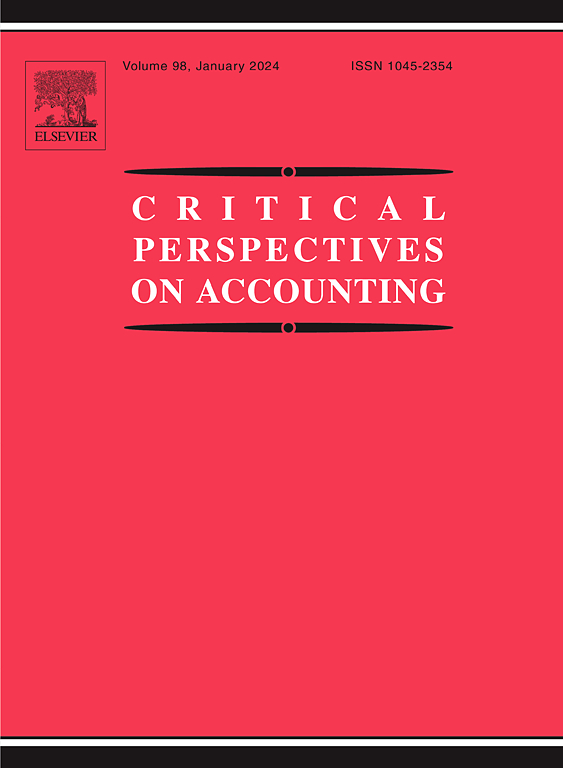Reimagining the foundation of financial reporting: A rights-based approach to account for environmental externalities
IF 5.7
2区 管理学
Q1 BUSINESS, FINANCE
引用次数: 0
Abstract
There is increasing awareness in the critical accounting literature that the silos between financial accounts and sustainability reports cement the displacement of environmental externalities in the disclosure narrative of business entities. This paper aims to break down the silos between financial and sustainability reporting by proposing an alternative conceptual foundation that incorporates an entity’s environmental externalities into its financial accounts. In our endeavor, we draw inspiration from Boltanski and Thévenot’s (2006) “orders of worth” framework to detail how the logic of the market world underpins and reinforces the siloed approach in traditional financial reporting. We show how neo-institutional economics was translated into the conceptual foundation of assets and liabilities and shields an entity’s financial position and performance from its environmental externalities. Based on this analysis, the paper mobilizes features of a green order of worth and introduces the concept of environmental wealth owned by the society at large. We argue that the institutionalization of this transnational body creates an accounting device that can transcend both the market and green rationality within financial reporting, allowing for the recognition of a firm’s environmental liabilities in financial accounts.
重新构想财务报告的基础:以权利为基础的方法来考虑环境外部性
在重要的会计文献中,越来越多的人意识到,财务账户和可持续发展报告之间的孤岛巩固了企业实体披露叙述中环境外部性的取代。本文旨在通过提出将实体的环境外部性纳入其财务账户的替代概念基础,打破财务报告和可持续发展报告之间的孤岛。在我们的努力中,我们从Boltanski和thsamvenot(2006)的“价值顺序”框架中获得灵感,以详细说明市场世界的逻辑如何支撑和加强传统财务报告中的孤立方法。我们展示了新制度经济学如何被转化为资产和负债的概念基础,并保护实体的财务状况和绩效不受其环境外部性的影响。在此基础上,本文运用绿色价值秩序的特征,引入了全社会拥有的环境财富概念。我们认为,这个跨国机构的制度化创造了一种会计手段,可以超越市场和财务报告中的绿色理性,允许在财务账户中确认公司的环境负债。
本文章由计算机程序翻译,如有差异,请以英文原文为准。
求助全文
约1分钟内获得全文
求助全文
来源期刊

Critical Perspectives on Accounting
BUSINESS, FINANCE-
CiteScore
9.40
自引率
7.80%
发文量
91
期刊介绍:
Critical Perspectives on Accounting aims to provide a forum for the growing number of accounting researchers and practitioners who realize that conventional theory and practice is ill-suited to the challenges of the modern environment, and that accounting practices and corporate behavior are inextricably connected with many allocative, distributive, social, and ecological problems of our era. From such concerns, a new literature is emerging that seeks to reformulate corporate, social, and political activity, and the theoretical and practical means by which we apprehend and affect that activity. Research Areas Include: • Studies involving the political economy of accounting, critical accounting, radical accounting, and accounting''s implication in the exercise of power • Financial accounting''s role in the processes of international capital formation, including its impact on stock market stability and international banking activities • Management accounting''s role in organizing the labor process • The relationship between accounting and the state in various social formations • Studies of accounting''s historical role, as a means of "remembering" the subject''s social and conflictual character • The role of accounting in establishing "real" democracy at work and other domains of life • Accounting''s adjudicative function in international exchanges, such as that of the Third World debt • Antagonisms between the social and private character of accounting, such as conflicts of interest in the audit process • The identification of new constituencies for radical and critical accounting information • Accounting''s involvement in gender and class conflicts in the workplace • The interplay between accounting, social conflict, industrialization, bureaucracy, and technocracy • Reappraisals of the role of accounting as a science and technology • Critical reviews of "useful" scientific knowledge about organizations
 求助内容:
求助内容: 应助结果提醒方式:
应助结果提醒方式:


